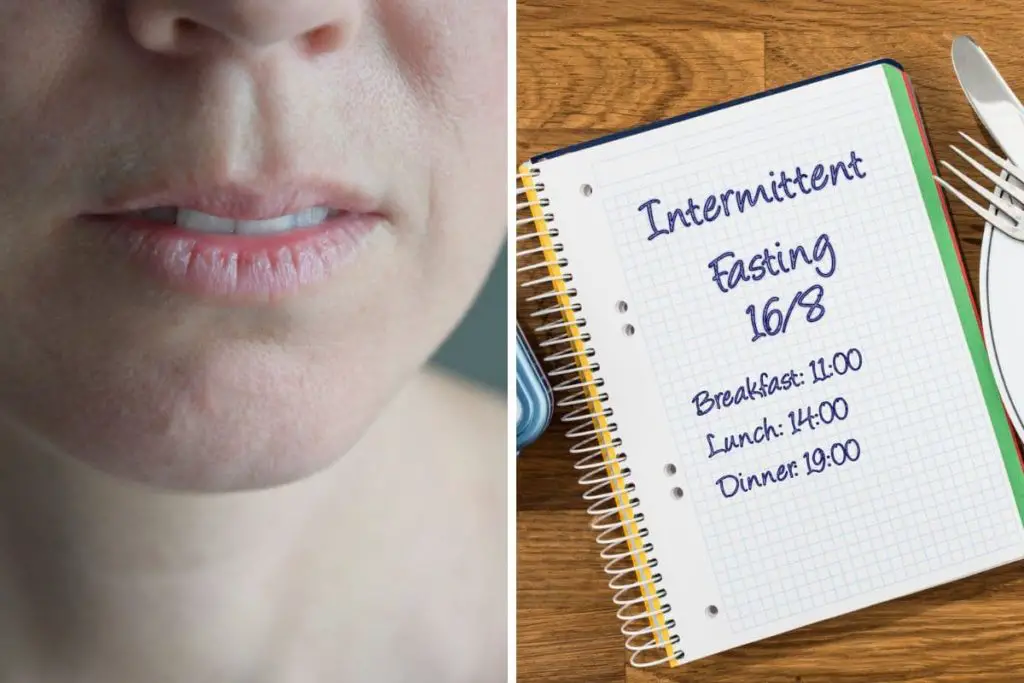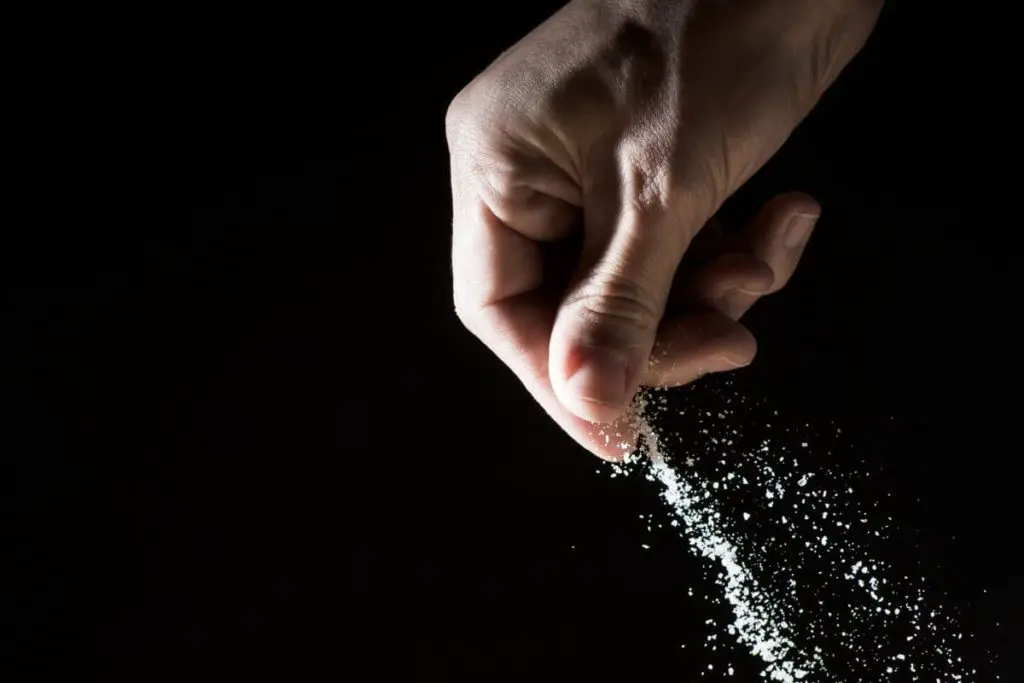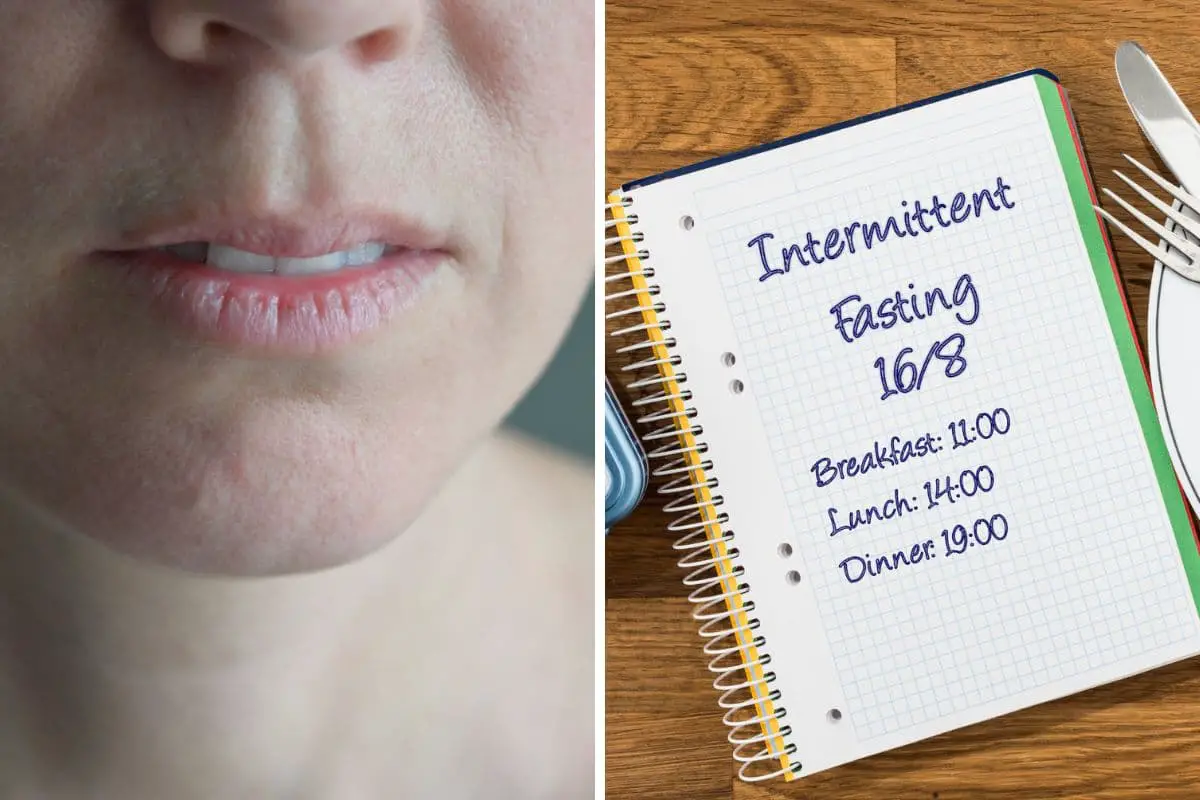Intermittent fasting is an excellent way to manage your appetite, lose excess weight, and improve your overall weight. But it does come with challenges and side effects, among which having a dry mouth is arguably one of the most bothersome. So how do we keep it from happening at all?
You can prevent a dry mouth when intermittent fasting by staying hydrated, limiting caffeine intake, and maintaining good oral hygiene. Furthermore, sipping on bone broth and eating a pinch of salt are great ways to replenish lost electrolytes, which is a primary cause of a dry mouth.
To understand this fasting side effect better, let’s talk about dry mouth in more detail and discuss different ways you can tackle it or (even better) prevent it from occurring during an intermittent fast.

What Is Dry Mouth?
Dry mouth, which is medically known as xerostomia, is a condition where the salivary glands do not produce as much saliva as they should, which can affect the health of our teeth and gums. This promotes bacterial growth, gives our breath a foul odor, and makes consuming food or drinks uncomfortable.
While intermittent fasting is known to cause dry mouth, it is not the only thing that can lead to it. Certain medications, medical treatments, breathing through the mouth, and even aging can cause dry mouth.
Fortunately, you don’t have to have a dry mouth when you are fasting. As long as you know what to do, you can go through your fasting routine without ever experiencing it at all.
Ways To Prevent and Treat Dry Mouth When Fasting
Because we restrict or significantly reduce the amount of calories we consume during an intermittent fast, our bodies cannot get the electrolytes that we normally absorb through the food we eat.
While our bodies are equipped with an electrolyte reserve, these run out pretty quickly. And in a matter of a couple of days without food, our electrolyte reserve runs out, making us feel weak, dizzy, irritable, and, yes, have a dry mouth.
The good news is that though having a dry mouth is common during intermittent fasting, it is not necessarily something you should experience.
Here are five things that you can do to prevent a dry mouth when intermittent fasting:
Stay Hydrated
The first and most important thing that you can do to prevent a dry mouth when intermittent fasting is to stay hydrated. Make sure that your body has enough fluids throughout the day. Ideally, you should maintain a water intake of two to three liters a day, even if you are not as physically active (because of the fast).
It’s helpful to have a water bottle with you at all times, especially if you’re the type who usually doesn’t drink much water. Also, doing this will encourage you to have frequent small sips, as compared to drinking bursts of water that are uncomfortable and won’t motivate you to keep drinking more water.
However, ensure you are within the three-liter limit, as drinking too much water can also make you lose more electrolytes, which you definitely do not want.

Suck on Ice Cubes
Another trick to prevent a dry mouth is to suck on small ice cubes. This is a quick fix if you’re already feeling the impact of electrolyte loss and are starting to feel a little dry in the mouth.
Sucking on ice cubes throughout the day will maintain the moisture in your mouth, but it also does something a lot more important – it can curb any hunger pangs or food cravings that you may have (which can feel more intense when you have a dry mouth).
Maintain Good Oral Hygiene
One of the worst effects of dry mouth is bad breath. When your salivary glands do not produce enough saliva, bacteria can thrive in your mouth, causing your breath to have a foul odor.
But it’s not only the bacterial growth that’s to blame. When we fast, our bodies metabolize fat instead of food to use as fuel or energy. And the byproduct of this process is acetone.
Unfortunately, because we also lose electrolytes when we fast, we don’t produce enough saliva to neutralize acetone, which leads to bad breath. Therefore, it’s common for people who fast to notice their breath starting to smell funny.
To keep your breath fresh, maintain proper oral hygiene by brushing your teeth regularly with fluoride toothpaste and using a mouthwash. However, ensure you choose a mouthwash that doesn’t contain alcohol, as it can be drying.
Sip on Bone Broth
An effective way to prevent a dry mouth is replenishing your electrolytes. You can do this by sipping on bone broth. Bone broth is very nourishing, can alleviate your hunger pangs, and replenish your electrolytes to prevent a dry mouth altogether.
However, ensure that the type of fast you’re on accommodates bone broth, as it contains a few calories. Therefore, if you can consume a limited amount of calories or are allowed an eating window, bone broth is a great option, as its calorie content is pretty low while having numerous health benefits.
Eat a Pinch of Salt
Another good way to replenish lost electrolytes is by consuming tiny portions of salt. To do this, take a pinch of salt and put it on your tongue, or mix it in your water. This helps a great deal when you are feeling intense hunger pangs or have food cravings, but it is also a great way to replenish your electrolytes, so you don’t have a dry mouth.

However, don’t go overboard – take only a pinch at a time, and don’t consume salt too often. A good sign that you need it is when your hunger pangs are intense or when you are feeling significant physical discomfort because of hunger.
Final Thoughts
While a dry mouth is a common side effect of intermittent fasting, it doesn’t have to be something you must go through. Listen to your body and know when you need to replenish your electrolytes. Also, remember to maintain good oral hygiene and stay hydrated.

